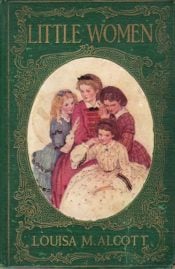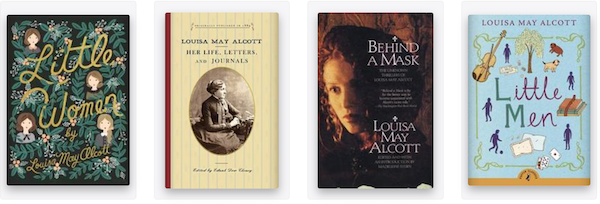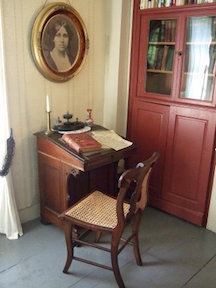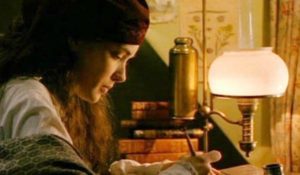How Louisa May Alcott Came to Write Little Women
By Nava Atlas | On May 30, 2017 | Updated October 4, 2022 | Comments (0)

“Overnight sensations”—authors whose first books are smash successes—are a rarity, if they exist at all; for even a stellar first effort is most often preceded by years of false starts, sweat, and toil that become invisible once the book is perched on the bestseller list.
What’s more common resembles Louisa May Alcott’s experience—years or decades of steady effort until success seems to “suddenly” arrive.
That’s how it happened for Alcott with Little Women. As we’ve come to find out, she cranked out thrillers, gothic novels, plays, sketches, and more than eighty articles before penning her autobiographical (if highly idealized) novel.
The reception of Moods was disappointing
The first serious novel Louisa May Alcott published under her real name was Moods. Published in 1864, Moods followed the solid, moderate success of Hospital Sketches, nonfiction essays on her experiences as a Civil War nurse.
Critical and public reception of her first attempt at serious fiction was disappointing and left its author dejected. Weary of churning out the sensational tales that were her financial mainstay, Alcott felt for a time adrift as to her identity as an author.
In 1868, her publisher offhandedly asked that she try writing a “girls’ story” for their list. Thinking little of the request, she cranked it out in two and a half months, though her heart wasn’t in it. Neither she nor her publisher thought it was in any way remarkable. Still, it was fast-tracked, and the proof of the entire book was ready in a month or so after the author turned in the manuscript.
. . . . . . . . . .

Moods by Louisa May Alcott
. . . . . . . . . .
And so, to begin Little Women …
Here, from Alcott’s own 1868 journals, is the progression of how Little Women came to be:
May, 1868—Mr. N. wants a girl’s story, and I begin “Little Women.” Marmee, Anna, and May all approve my plan. So I plod away, though I don’t enjoy this sort of thing. Never liked girls or knew many, except my sisters; but our queer plays and experiences may prove interesting, though I doubt it.
June, 1868—Sent twelve chapters of “L.W.” to Mr. N. He thought it dull, and so do I. But work away and mean to try the experiment; for lively, simple books are very much needed for girls, and perhaps I can supply the need.
August, 1868—Roberts Bros. made an offer for the story, but at the same time advised me to keep the copyright; so I shall.
August 26, 1868—Proof of whole book came. It reads better than I expected. Not a bit sensational, but simple and true, for we really lived most of it; and if it succeeds that will be the reason of it. Mr. N. likes it better now and says some girls who have read the manuscript say it is “splendid”! As it is for them, they are the best critics, so I should be satisfied.
September 30th— First edition gone and more called for. Expects to sell three or four thousand before the new year. Mr. N. wants a second volume for spring. Pleasant notices and letters arrive, and much interest in my little women, who seem to find friends by their truth to life, as I hoped.
. . . . . . . . . .

. . . . . . . . . .
Little Women was an immediate success
The book truly was an overnight success, wildly exceeding expectations of both the author and publisher, and seemed to all but assure the financial success of most if not all her subsequent works, with a public hungry for any work in the style that became her stock in trade. No more anonymous thrillers for Miss Alcott!
With typical self-deprecation, she describes how readily work is sold to publishers after becoming a bestselling author: “Funny time with the publishers about the tale; for all wanted it at once, and each tried to outbid the other for an unwritten story,” she wrote in an 1874 journal entry:
“I rather enjoyed it, and felt important with Roberts, Low, and Scribner all clamoring for my ‘’umble’ works. No more peddling poor little manuscripts now, and feeling rich with $10.”
. . . . . . . . . .
Louisa wrote Little Women at her desk in Orchard House
. . . . . . . . . .
She liked the financial rewards
For Alcott, ascending to the level at which publishers vied for her work was evidently a delicious feeling. It wasn’t long before the book made its author fame and brought her the financial ease she had long craved.
“Over a hundred letters from boys & girls,” commented Louisa May Alcott in 1872, “& many from teachers & parents assure me that my little books are read & valued in a way I never dreamed of seeing them. This success is more agreeable to me that money or reputation.”
From the sales of Little Women and its sequels, Alcott did amass what at the time was a small fortune relative to writers. However modestly she viewed her talent, she didn’t shy away from claiming her financial due, and when success arrived, it was sweet indeed.
— Adapted from The Literary Ladies’ Guide to the Writing Life by Nava Atlas
. . . . . . . . . .
10 Writers Who Were Inspired by Jo March of Little Women


Leave a Reply